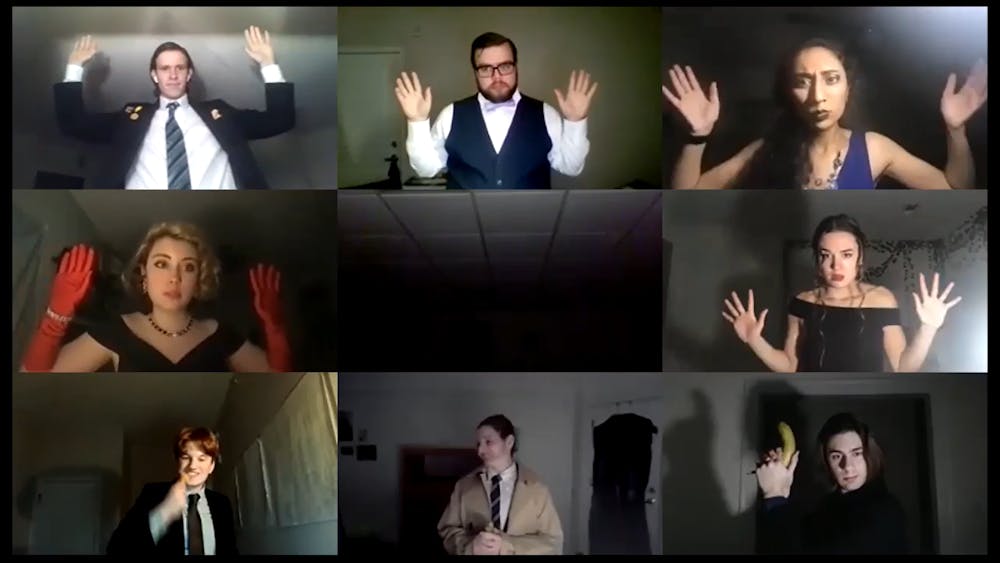The Barnstormers return to our home-theaters once again with the warmth of easy-going comedy and the intrigue of a classic “whodunnit” narrative in their special Clue: Stay at Home. The production was a livestreamed virtual adaptation of Clue, a screenplay inspired by the timeless Hasbro board game and iconic film of the same name.
Clue: Stay at Home is a step beyond the troupe’s first foray into virtual programs: a December rendition of Louisa May Alcott’s Little Women. While their Little Women was a purely auditory experience, this production of Clue invited the audience to watch the narrative unfurl in the expressions and avid gesticulations of the cast in their individual frames. This curious though clever approach to the visual element of theatre occurred on the all-too-familiar Zoom. Each cast member commanded their own stage, appearing and reappearing under the seamless control of Stage Manager Noa Vineberg.
The production follows the story of six “strangers,“ mysteriously invited to a remote mansion by a certain Mr. Boddy (freshman Eirnin Mahoney), ushered in and served by an ebullient French maid (sophomore Caroline Colvin), cryptic cook (junior Rebecca Reed) and the dubious butler, Wadsworth (sophomore Brianna Groch). The six guests, Colonel Mustard (junior Zach Galvarro), Mrs. White (junior Sandy Clancy), Mrs. Peacock (senior Ritika Kommareddi), Mr. Green (sophomore Owen Welsh), Miss Scarlet (sophomore Hanna Al-Kowsi) and Professor Plum (senior Ben Leach), realize that there are devious motives at play in this dinner party and are soon plunged into an outlandish, murderous pandemonium.
Similar to Little Women, the scenes were narrated. Stage directions and actions were spoken aloud by senior Deb Weidman, a smooth and articulate speaker whose rapid delivery drove the thrill of several scenes. Watching Groch as Wadsworth fall after the narrator’s description added a touch of youthful humor, as if the events unfolded under the direction of children’s imaginations as they played the board game.
“There is something objectively special about the Barnstormers’ adaptation of Clue,” Director Gabriel Feuerstein-Mendik articulates. The production shines as a homage to chaotic childhood memories spent musing over the turns of the classic game, tempting a jovial reminiscence in familiar audiences.
The program itself was casual in its conventional characterizations but in a manner that an audience might appreciate as a cozy theatrical experience. Leaning on the familiarity of the genre and its endearing humor, even an audience unfamiliar with the premise of the game would value the humor of the nonsensical twists and groan-worthy wordplay. The production grows on the viewer, and further in you begin to realize that the play is more self-aware than initially perceived. Of course, this becomes alarmingly and amusingly obvious when Mr. Green proceeds to consume the banana he had been using as a prop for a gun.
In an interview with The News-Letter, Al-Kowsi revealed subtler aspects of the production experience.
“It’s a totally different experience acting over Zoom. You really can’t look someone in the eye,” she said.
Al-Kowski discussed the transition from audio to video production. Although the visuals allowed the company to return to a reliance on physical performance, she said, it was an acutely different feel to the familiar physical connection to the stage.
“Plus, it was wild to have to keep all my props on my already-crowded desk!” she said.
Lighting was another element that the troupe handled differently, making the Zoom “stages” compatible to lend the illusion that each standalone actor was in the same room. While subtle differences were inevitable, it was not overly difficult to suspend disbelief and imagine each rectangle to be an individual camera trained on each character.
Feuerstein-Mendik admitted that, behind the scenes, “we had our fair share of problems.” No strangers to the quirks of online technology, the company waded through the glitches, lags and often-disappointing features of Zoom. The coordination of the videos in the final production, hiding and revealing the characters in each scene, disclosed the rigor and intensity of their rehearsals. The sounds of gunshots and rain appeared impressively organic with no single, discernable source that might break the illusion of the actors’ vicinity.
The only instance of a technical mishap, albeit a mostly insignificant one, occurred at Colonel Mustard’s entry. His mic was muted as he delivered his first dialogue, but the butler, after a brief hesitation, filled the moment of silence with an improvised “you must speak up!”
Fortunately, the momentary lapse held little effect and could be serendipitously chalked up to the pattering rain in the scene, voiding the Colonel’s voice from comprehension. The coincidence that this befell the ditsy character was also not lost, and as Feuerstein-Mendik noted, Zoom glitches are really just an additional punchline in the joke.
The image of the cast zealously bringing the production together — at first from across the country, then from across Baltimore for the final show — is a pleasing instance of how a passionate group can recreate an experience that may have otherwise seemed elusive in this online epoch.
“Clue has been something I have been able to turn to to lighten me up,” Feuerstein-Mendik said.
Watching with a smile as the characters appear to pass items to one another through their screens, wondering whether Mrs. Peacock’s real-life neighbors could hear her chilling screams or waiting with appropriate suspense for the cop (sophomore Kylin McHugh)’s entry, the mayhem of Clue: Stay at Home is a welcome reprieve for its audience.
As Al-Kowsi remarked, “it was a campy, funny, strange production, and it was meant to be a good time.”





